The cloud computing industry is booming, with an anticipated CAGR of 21.8% by 2030. As adoption accelerates, cloud roles are evolving fast, but the expectations keep rising faster.
From engineers to architects to now FinOps, professionals are expected to manage complex environments, optimize costs, and keep up with new service rollouts, often across multiple clouds. Without formal training or certification, staying relevant and advancing in this space can feel like guesswork.
Microsoft Azure remains one of the most widely used cloud platforms, and its certification paths are designed to build practical, role-based expertise. Whether you’re entering the field or leveling up, the right certification can help validate your skills, sharpen your focus, and open the door to more specialized or senior opportunities.
In this guide, we’ll break down the top Microsoft Azure certifications to pursue in 2025 — what they cover, who they’re for, and how they can support your cloud career goals.
Benefits of Obtaining Azure Certifications
Earning various Azure certifications doesn’t just open up new career opportunities, they also help teams deliver more value to their organizations. Here’s how certified professionals drive impact:
Ensuring team expertise in Azure’s cloud ecosystem
Microsoft Azure certifications ensure your team has the skills needed to work effectively in Azure’s cloud environment. These certification programs help build a reliable and future-proof foundation in cloud computing. Two ways they can benefit you and your team’s expertise include:
- Build foundational knowledge: Azure courses give you structured learning paths that cover cloud fundamentals, architecture, and best practices. For example, the Azure Fundamentals certification introduces essential concepts like Azure services, pricing, and governance.
- Develop hands-on skills: Certifications like the Azure Administrator Associate and Azure Developer Associate focus on practical skills for deploying virtual machines, databases, and networking solutions. Your team gets hands-on experience with Azure Portal, CLI, and Resource Manager templates.
Improving cloud security, compliance, and governance
Getting a Microsoft Azure certification can greatly benefit your ability to handle cloud security and regulatory compliance issues, which is a major priority for security-focused organizations.
For example, the Azure Security Engineer Associate certification helps you ensure infrastructure aligns with standards and best practices like the Microsoft Cloud Security Benchmark (MCSB). Through Azure Security Center and Microsoft Sentinel, you can identify vulnerabilities, detect threats, and respond quickly to incidents.
Enhancing cloud cost management and operational efficiency
Azure certifications give professionals a deeper understanding of how Azure infrastructure works, which is essential for identifying inefficiencies, analyzing usage patterns, and optimizing costs. Instead of treating Azure cost management as an afterthought, certified team members are equipped to design and operate workloads with cost efficiency in mind from the start.
Fundamental Azure Certifications
If you’re looking to build a strong foundation in Microsoft Azure, the following fundamental programs cover key areas such as AI, data, and general cloud principles.
Azure Fundamentals (AZ-900)
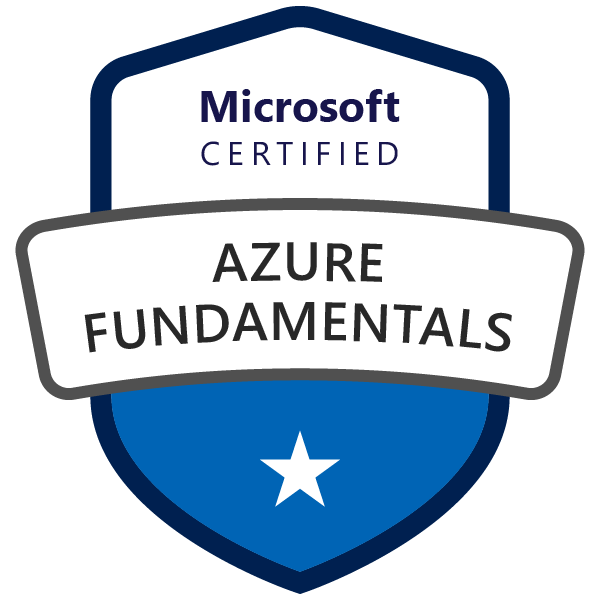
The Azure Fundamentals certification gives you a foundational knowledge of cloud concepts, core Azure services, and Azure management & governance features. No prerequisites are needed, so it’s an ideal first step for beginners or anyone looking to advance their basic Azure skills.
- Course content:
- Understanding cloud computing concepts, benefits, and deployment models (public, private, hybrid)
- Exploring Azure architecture components and services for compute, networking, and storage
- Implementing Azure management tools, cost management, and governance methodologies
- Pricing: Pricing is based on where the exam is proctored. The cost is $99 USD for those taking the exam in the United States. You can access the updated details on the official website.
- Intended audience:
- Ideal for technology professionals looking to demonstrate foundational knowledge of cloud concepts and Azure services.
- Suitable for those starting to know more about the Azure offerings, its infrastructure and gain certification for career betterment.
Azure AI Fundamentals (AI-900)
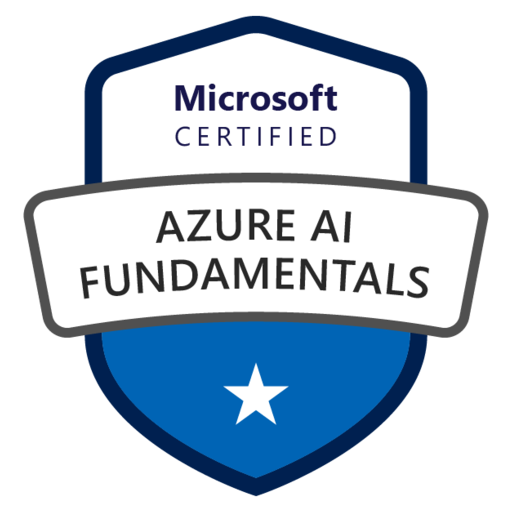
The Azure AI Fundamentals certification demonstrates your knowledge of machine learning and AI concepts along with related Microsoft Azure services. It’s designed for individuals with both technical and non-technical backgrounds, though the course recommends having a basic knowledge of cloud solutions and client-server applications.
- Course content:
- Exploring AI fundamentals and machine learning basics
- Analyzing text with Natural Language Processing on Azure
- Extracting insights from documents with Azure AI services
- Developing generative AI solutions with Azure OpenAI Service
- Pricing: Pricing is based on where the exam is proctored. The cost is $99 USD for those taking the exam in the United States. You can access the updated details on the official website.
- Intended audience: Ideal for individuals starting with AI, including those with non-technical backgrounds. No prior data science or software engineering experience is needed.
Azure Data Fundamentals (DP-900)
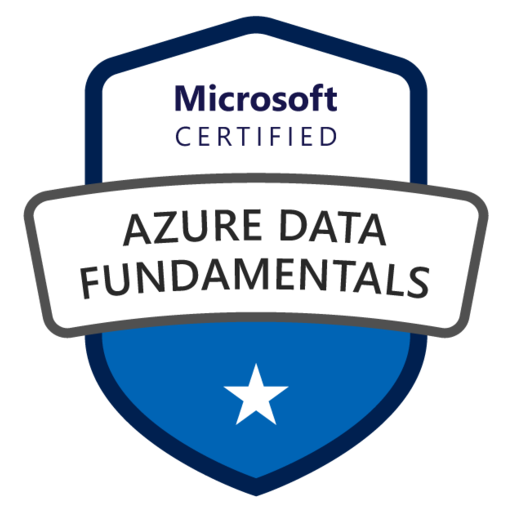
The Azure Data Fundamentals certification validates your understanding of core data concepts and how they’re implemented using Microsoft Azure data services. You should be familiar with relational and non-relational data, as well as different types of data workloads, before taking the certification exam.
- Course content:
- Exploring core data concepts, including data types, storage, and processing
- Implementing relational database solutions with Azure SQL Database and SQL Managed Instance
- Building non-relational data solutions with Azure Cosmos DB and Azure Storage
- Designing data analytics solutions with Azure Synapse Analytics, Azure Databricks, and Azure HDInsight
- Pricing: Pricing is based on where the exam is proctored. The cost is $99 USD for those taking the exam in the United States. You can access the updated details on the official website.
- Intended audience: Designed for individuals beginning to work with data in the cloud, familiar with relational and non-relational data concepts, as well as different types of data workloads.
Associate Azure Certifications
Associate-level Azure certifications are ideal for professionals looking to validate hands-on skills in administering, developing, securing, and managing Azure environments. While not mandatory, completing a Fundamentals certification first can provide helpful context, especially for those new to Azure — but it’s not a prerequisite.
Below, we explore key Associate certifications offered by Microsoft and what each path helps you specialize in.
Azure Administrator Associate (AZ-104)
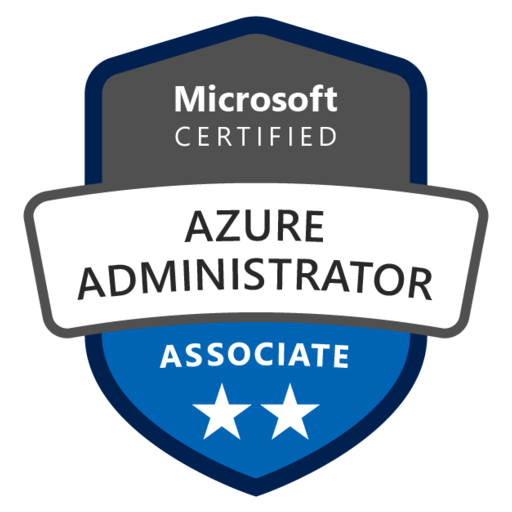
The Azure Administrator Associate certification validates your ability to implement, manage, and monitor Azure solutions for compute, storage, networking, and security. It demonstrates practical skills in managing identity, governance, virtual networks, and resource provisioning within an enterprise Azure environment. This certification is ideal for professionals responsible for day-to-day administration and operational tasks in Azure.
- Course content:
- Managing Azure identities and governance
- Implementing and managing storage solutions
- Deploying and managing Azure compute resources
- Implementing and managing virtual networks
- Monitoring and maintaining Azure resources
- Pricing: Pricing is based on where the exam is proctored. The cost is $165 USD for those taking the exam in the United States.
- Intended audience:
- This certification is designed for Azure administrators with experience in implementing, managing, and monitoring identity, governance, storage, compute, and virtual networks in a cloud environment.
- Candidates should be familiar with operating systems, networking, servers, virtualization, and have experience with tools such as PowerShell, Azure CLI, the Azure portal, Azure Resource Manager templates, and Microsoft Entra ID.
Azure Developer Associate (AZ-204)
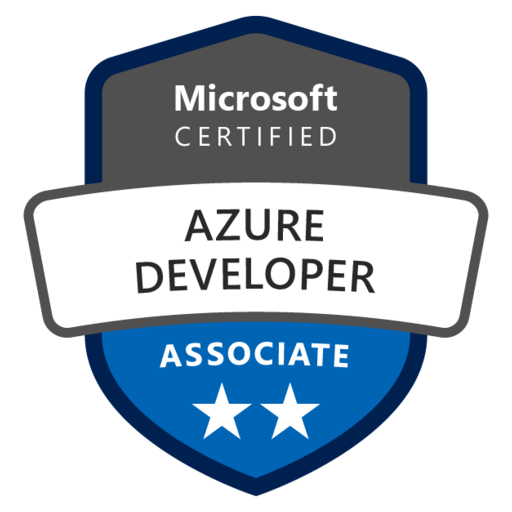
The Azure Developer Associate certification validates your ability to design, build, test, and maintain cloud applications using Microsoft Azure. It’s ideal for developers experienced with Azure SDKs, APIs, app authentication, containers, and compute services. This certification demonstrates your skills in writing scalable cloud-native applications and integrating with Azure services across the development lifecycle.
- Course content:
- Developing Azure compute solutions, including Azure Functions and App Service Web Apps
- Implementing Azure security, managing identity and access
- Developing for Azure storage, working with relational and non-relational databases
- Monitoring, troubleshooting, and optimizing Azure solutions
- Pricing: Pricing is based on where the exam is proctored. The cost is $165 USD for those taking the exam in the United States.
- Intended audience:
- This certification is designed for developers with 1-2 years of professional experience in cloud platforms and proficiency in programming with Azure SDKs.
- Candidates should be adept at designing, building, testing, and maintaining cloud applications and services on Microsoft Azure.
Azure Security Engineer Associate (AZ-500)
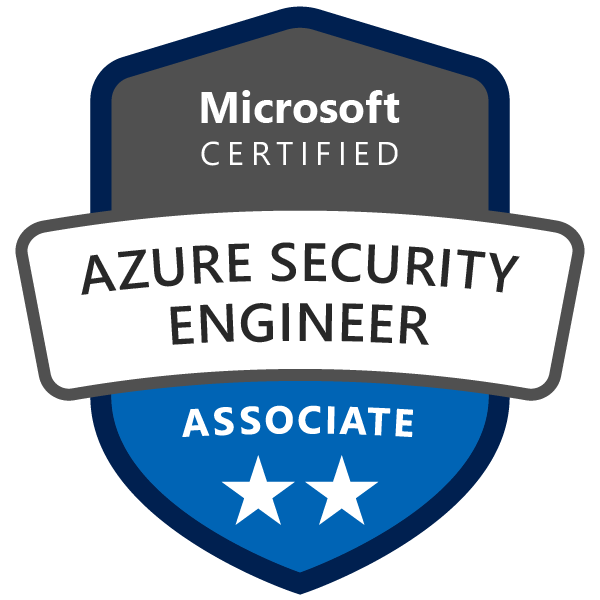
The Azure Security Engineer Associate certification validates your ability to implement security controls, manage identity and access, protect data, and monitor security operations in Microsoft Azure. It’s designed for professionals responsible for maintaining an organization’s security posture, identifying vulnerabilities, and responding to incidents, often in collaboration with architects, administrators, and developers.
- Course content:
- Fortifying authentication systems and implementing privilege management frameworks
- Deploying defense-in-depth strategies to safeguard infrastructure and workloads
- Orchestrating threat detection, incident response, and security monitoring practices
- Protecting sensitive information with advanced data protection and application security measures
- Pricing: Pricing is based on where the exam is proctored. The cost is $165 USD for those taking the exam in the United States.
- Intended audience:
- This certification is designed for Azure security engineers who implement security controls, manage identity and access, and protect data, applications, and networks in cloud and hybrid environments.
- Candidates should have strong familiarity with Microsoft Entra ID, as well as experience with Azure compute, network, and storage services.
Azure Data Scientist Associate
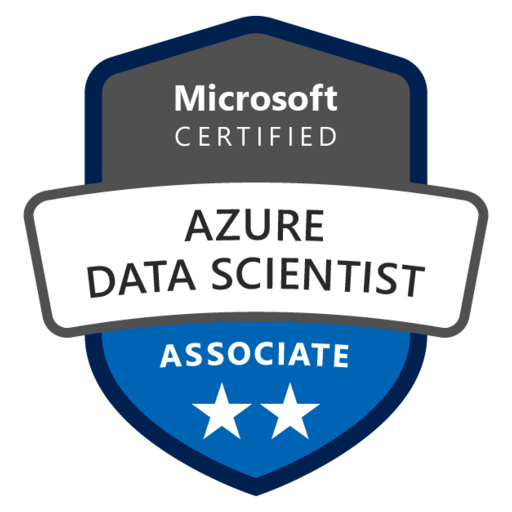
The Azure Data Scientist Associate certification validates your ability to apply data science and machine learning techniques to train, evaluate, and deploy models in Azure. It includes working with Azure Machine Learning, handling large datasets, and optimizing AI and LLM workloads for performance and scalability.
- Course content:
- Setting up and navigating the Azure Machine Learning environment for efficient workflows
- Building and analyzing data science experiments to validate hypotheses and evaluate models
- Fine-tuning machine learning models to achieve optimal performance and accuracy
- Implementing production-ready model deployment pipelines with monitoring capabilities
- Creating cutting-edge generative AI applications using Azure AI Foundry
- Pricing: Pricing is based on where the exam is proctored. The cost is $165 USD for those taking the exam in the United States.
- Intended audience:
- This certification is designed for data scientists with experience in Python and machine learning frameworks like Scikit-Learn, PyTorch, and TensorFlow.
- Candidates should be proficient in managing data ingestion and preparation, model training, deployment, and monitoring using Azure Machine Learning and MLflow.
Azure Network Engineer Associate (AZ-700)
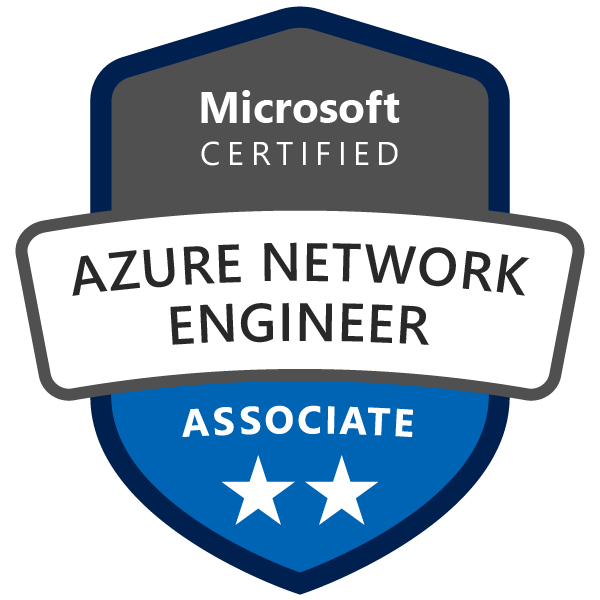
The Azure Network Engineer Associate certification demonstrates your skills in designing, implementing, and managing Azure networking solutions, including core infrastructure, hybrid connectivity, network security, and application delivery. It emphasizes performance optimization, scalability, and proactive monitoring to ensure secure and reliable network operations.
- Course content:
- Architecting and deploying foundational networking components including virtual networks, routing, and DNS
- Configuring and optimizing hybrid connectivity solutions for cross-environment communication
- Implementing advanced application delivery mechanisms and load-balancing strategies
- Establishing secure private endpoints and service connections for Azure PaaS offerings
- Fortifying network security through NSGs, firewalls, and connection monitoring
- Pricing: Pricing is based on where the exam is proctored. The cost is $165 USD for those taking the exam in the United States.
- Intended audience:
- This certification is designed for Azure network engineers with experience in planning, implementing, and managing Azure networking solutions.
- Candidates should have a strong understanding of networking fundamentals, including IP addressing, DNS, and routing, as well as experience with Azure networking services.
Expert Azure Certifications
Expert-level Azure certifications are designed for professionals with advanced experience in cloud environments. These certifications validate deep expertise in areas like cloud architecture, DevOps, and cross-functional solution design, making them ideal for senior roles driving technical strategy and large-scale cloud initiatives.
Azure Solutions Architect Expert (AZ-305)
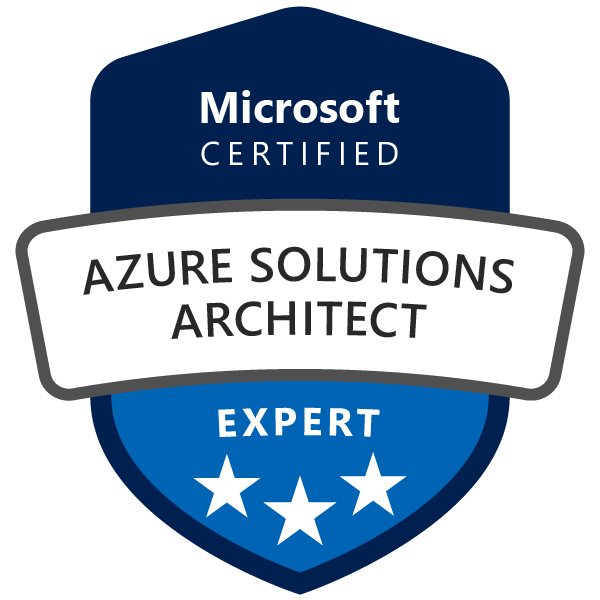
The Azure Solutions Architect Expert certification validates advanced skills in designing and implementing secure, scalable, and reliable cloud and hybrid solutions on Azure. It covers key areas such as compute, networking, storage, security, and monitoring. Ideal for experienced Solutions Architects, this certification highlights your ability to translate business requirements into technical designs while aligning with frameworks like the Azure Well-Architected Framework and Cloud Adoption Framework. It’s suited for professionals who regularly collaborate with cross-functional teams to deliver enterprise-grade Azure solutions.
- Course content:
- Architecting robust identity frameworks, establishing governance policies, and crafting comprehensive monitoring strategies
- Developing scalable data storage architectures that are optimized for performance, security, and compliance
- Formulating resilient business continuity and disaster recovery plans aligned with organizational requirements
- Engineering infrastructure solutions, including compute, network, and migration strategies for complex enterprise environments
- Pricing: Pricing is based on where the exam is proctored. The cost is $165 USD for those taking the exam in the United States.
- Intended audience:
- This certification is designed for Azure Solution Architects with experience in IT operations, including networking, virtualization, identity, security, business continuity, disaster recovery, data platforms, and governance.
- You should also have experience with Azure administration, Azure development, and DevOps processes.
DevOps Engineer Expert (AZ-400)
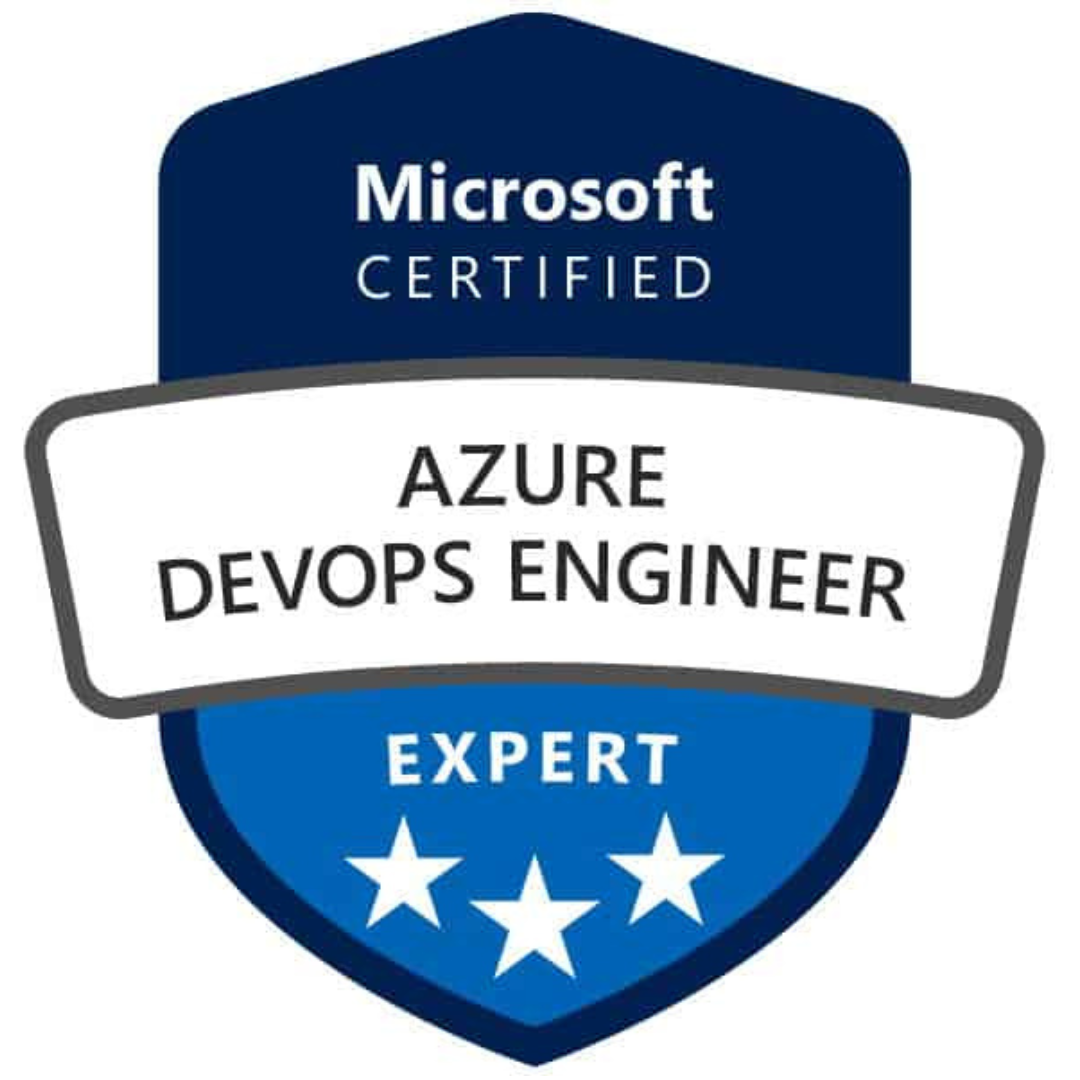
The DevOps Engineer Expert certification validates your ability to implement DevOps practices across people, processes, and technologies to enable continuous integration and delivery. It focuses on designing and optimizing workflows, source control, infrastructure as code, and automation. DevOps engineers collaborate with developers, administrators, SREs, and security teams to streamline deployment and operations.
- Course content:
- Establishing effective DevOps workflows and team collaboration frameworks
- Architecting robust source control environments for code integrity and collaboration
- Constructing automated CI/CD pipelines for reliable software delivery
- Formulating comprehensive security strategies aligned with DevOps practices
- Deploying monitoring solutions for operational visibility and performance insights
- Pricing: Pricing is based on where the exam is proctored. The cost is $165 USD for those taking the exam in the United States.
- Intended audience:
- This certification is designed for DevOps professionals who have experience in both Azure administration and development.
- Candidates should have experience implementing and managing DevOps practices, including continuous integration, delivery, and monitoring, using Azure technologies.
Final Thoughts
Obtaining Microsoft Azure certifications offers serious advantages — whether you’re strengthening individual expertise or improving organizational cloud performance. These certifications help teams work more confidently in Azure, tighten security, and manage resources more efficiently.
And when it comes to cost optimization, certifications are just one part of the equation. For organizations looking to automate and scale Azure savings, a platform like ProsperOps can do the heavy lifting.
Book a ProsperOps demo today to see us in action!





